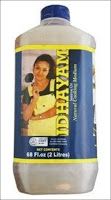The U.S. Court of Appeal for the Ninth Circuit reversed (in part) a district court's dismissal of a civil action for unfair competition, trademark dilution, and trademark infringement involving Defendant Meenakshi's three marks registered for sesame seed oil. The district court had dismissed the claims as to one of the marks (the "'654 mark") on the ground of claim preclusion, based upon the TTAB's dismissal of Plaintiff VVV's petition for cancellation of the registration for that one mark. The court of appeals ruled that claim preclusion did not apply because VVV was entitled to seek remedies unavailable at the TTAB. V.V.V. & Sons Edible Oils Limited v. Meenakshi Overseas, LLC, 2019 USPQ2d 494448 (9th Cir. 2019).

VVV sought to cancel Meenakshi's registrations of the mark IDHAYAM for sesame oil. VVV had previously opposed the underlying application for the '654 mark, but had defaulted, resulting in the TTAB's dismissal of that opposition claim. When VVV later petitioned to cancel the registration for the '654 mark (and two other registrations), the TTAB dismissed as to the '654 mark on the ground of claim preclusion. VVV then appealed to the CAFC, but that appeal was dismissed.
The instant lawsuit seeks damages and injunctive relief for unfair competition, trademark dilution, and trademark infringement as to Meenakshi's three registered marks, The factual allegations supporting VVV's claims "are nearly identical to the allegations in the 2009 Opposition."
The district court dismissed the claims only as to the '654 mark, solely based on claim preclusion, finding that the claims at the TTAB and in the lawsuit were largely identical, since VVV "relied on facts and theories in its Complaint that were in its Opposition or were otherwise available at the time of the TTAB proceedings."
The 9th Circuit ruled that an exception to claim preclusion applied here:
Under the Restatement (Second) of Judgments, an exception to claim preclusion applies if "[t]he plaintiff was unable to rely on a certain theory of the case or to seek a certain remedy or form of relief in the first action because of the limitations on the subject matter jurisdiction of the courts" and "the plaintiff desires in the second action to rely on that theory or to seek that remedy or form of relief." Restatement (Second) of Judgments § 26(1)(c).
***
If "formal barriers in fact existed and were operative against [the] plaintiff in the first action," however, "it is unfair to preclude" a litigant from bringing a second action relying on new theories or seeking new relief and the general rule does not apply. Id.; see also Restatement (Second) of Judgments § 25, cmt. e.
The court of appeals observed that the TTAB is empowered only to determine the right to registration. "The Board is not authorized to determine the right to use, nor may it decide broader questions of infringement or unfair competition."
This means the TTAB had no power to decide VVV's claims of infringement, dilution, and unfair competition or to "grant . . . either injunctive [relief] or damages." Rhoades v. Avon Prods., Inc., 504 F.3d 1151, 1158 (9th Cir. 2007). As a result, it would be unfair to preclude VVV from litigating these claims and seeking relief when barriers existed that prevented it from doing so in the first action.
The Board therefore reversed the dismissal of the VVV's claims concerning the '654 mark. The appellate court noted, however, that issue preclusion may apply to a TTAB ruling:
This does not mean, however, that parties who litigate trademark registration before the TTAB will always get the proverbial second bite at the apple if they subsequently file their claims in federal court. Any such concern is resolved by issue preclusion, which the Supreme Court recently recognized as applicable to TTAB proceedings. B & B Hardware, Inc. v. Hargis Indus., Inc., 575 U.S. 138, 158–60 (2015).
Read comments and post your comment here.
The content of this article is intended to provide a general guide to the subject matter. Specialist advice should be sought about your specific circumstances.

